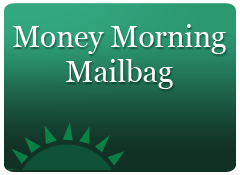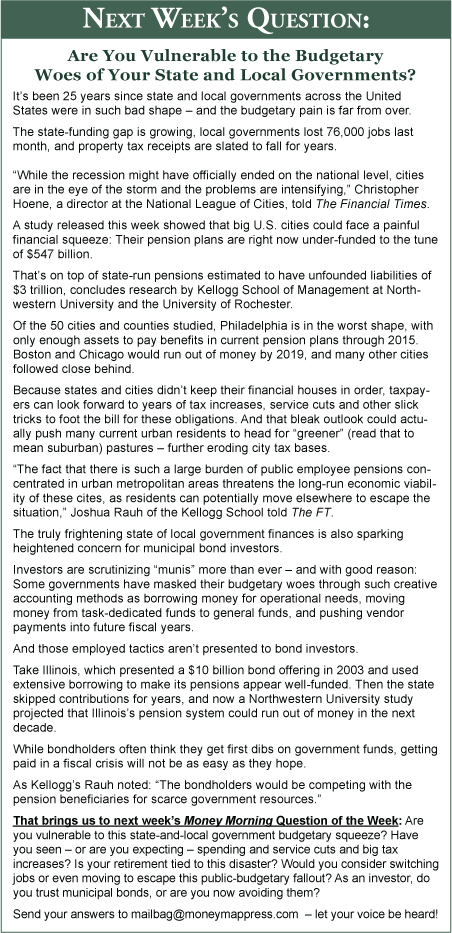An episode of the television news program "60 Minutes" that aired Oct. 10 highlighted investors' fears over the growing trend of high frequency trading (HFT) run by a world of "supercomputers."
The "60 Minutes" piece prompted this letter from a reader wondering if the technological shift means it's time to readjust investment strategy.
Sunday night on "60 Minutes" they had a story about high-speed computers that are out-trading humans. Is it time to refocus on the world stage and find tangible rather than paper investments to put your money in? A partnership in a retail or manufacturing venue surely is more transparent than the stock market.
--Roman
Money Morning has been examining the effects of high frequency trading for years. In August 2009 Contributing Editor Martin Hutchinson said high frequency trading systems were front-running the market.
"The bottom line for us ordinary market participants is that insiders are using computers to game the system, extracting billions of dollars from the rest of the market," said Hutchinson. "While it is illegal to trade on insider knowledge about company financials, these people are trading on insider knowledge about market order flow. That's how Goldman Sachs Group Inc. (NYSE: GS) and the other biggest houses make so much from trading. By doing so they are rent-seeking, not providing value to the market."

The high frequency trading system uses trading instructions that analysts create with algorithms based on statistical analysis, predicting shifts in stocks that can earn a penny a trade - and then replicate those earnings about 40 million times a day.
Instead of basing investment choices on company strength, management, earnings reports, industry trends and product quality, the profit-earning potential is based on mapping data. Any human connection or evaluation of trading is completely removed from the process.
While some suggest that these types of traders are privy to information not available to other investors, they are in fact getting the same information, but much faster. The computers can process numbers and trends fast enough to cash in on trading opportunities that exist for only fractions of a second - and those milliseconds could add up to millions or billions of profit each year.
Proponents of high frequency trading, like the New York Stock Exchange chief operating officer Larry Leibowitz who was interviewed by "60 Minutes," say it promotes lower transaction costs and increased liquidity.
But the lack of transparency and limited faith in the supercomputers continues to worry investors.
About four years ago, these types of trades made up only about 30% of trading, but now that number has soared to close to 70%. The increasing dependence on computers is cutting into investor confidence, especially when the high-frequency trading system was linked to the May 6 "flash crash" that prompted a 600-point drop in the Dow Jones Industrial Average in five minutes.

Securities and Exchange Commission Chairman Mary L. Schapiro told "60 Minutes" that similar glitches have occurred since the flash crash, due to algorithms performing in ways not expected by their programmers.
While regulators are pushing for more control over HFT, it does not seem to be going away. The Stock Exchange of Thailand (SET) this week became the latest country to embrace the high-speed system to attract more foreign investors. Exchange operators said they would be sure to instill "robust" risk systems to prevent a flash crash of their own.
So with global markets turning more toward HFT, is it better to retreat from the market and search for a "tangible" investment?
Hutchinson sees hard assets as a good alternative to financial assets right now because "for one thing we seem almost certain with current policies to suffer a burst of inflation."
"Manufacturing companies with high margins are one good area, as are retailers and other companies selling into emerging markets' domestic economies," he said. "And of course, in this economy you can't go far wrong with a good mine, provided you don't pay too much."
Still, investors don't need to retreat from the stock market completely. There are plenty of profit opportunities to be had even with the existence of HFT. One option for investors is to support a Tobin Tax to limit the massive profits of the high frequency traders.
Hutchinson said it would not need to be a large tax to inflict profit pain on the HFT world.
"The margins on this business are very slim - as little as a penny or two a share on a $20-a-share trade," said Hutchinson. "So even a 0.01% tax rate, costing 0.2 cents per share, would reduce those margins substantially. At the same time this business is very profitable, earning Wall Street in excess of $20 billion in 2009, with the leading firm, Goldman Sachs, reaping perhaps $5 billion of this total. Thus, even at the aforementioned 0.01% rate, the Tobin levy would tax 10% to 20% of this profit, generating $2 billion to $4 billion in revenue all by itself."
Supporting measures like the Tobin Tax would stop the shift in Wall Street toward high frequency trading.
"Such a tax would make the worst HFT types unprofitable without imposing significant costs on retail investors," said Hutchinson. "It would also provide funds to help run the vast apparatus of regulation and control that seems to be necessary to run a modern financial system."
And until changes come to the trading world, Money Morning Contributing Editor Shah Gilani advised investors to do their research.
"[A]sk for written "best practices" from your brokerage or trading venue on how they execute trades," said Gilani. "Demand to know what circuit breakers, failsafes and other protective measures are in place to protect you. Ask about what happened to market orders they executed during the flash crash: Did they get cancelled outright, or were they erroneously executed as a result of that late-day nosedive? And lastly, if disputes arose, how were they settled? The bottom line: Find out what rights you have, and get those guarantees in writing."
(**) Money Morning editors reserve the right to edit responses for grammar, length and clarity when posting on our Web site. Please include your name and hometown with your email.
News and Related Story Links:
- 60 Minutes:
Wall Street: The Speed Traders
- Money Morning:
What Really Caused the Stock Market 'Flash Crash'
- Money Morning:
Thursday's Wild Stock Market Ride Spotlights 'High-Frequency Trading' as the Latest Worry for Investors
- Money Morning:
High Frequency Trading: Wall Street's New Rent-Seeking Trick
- Financial Times:
Thai exchange welcomes high-frequency trading
- Money Morning Archives:
Money Morning Mailbag Feature


